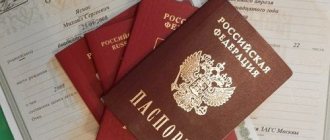The child’s right to housing: do children have the right to an apartment?
The issue of dealing with real estate increasingly arises among families with minor children.
Legislation protects the child's right to housing. Legal guardians do not have the right to independently deprive their wards of living space.
The rights of minor children to housing is a serious issue when dividing property. When divorcing, parents must be aware that their children together should not end up on the street.
When selling real estate where children under 18 years of age are registered, some features should also be taken into account. Therefore, parents should take into account all the nuances and prepare additional documents before selling real estate.
Dear readers! In our articles we consider typical ways to resolve legal issues, but each case is individual. If you want to find out how to solve your particular problem , please contact us through the online consultant form on the right or call us at:
+7 Moscow, Moscow region
+7 St. Petersburg, Leningrad region +7 Other regions Online consultant >> It's fast and free !
Rights of a minor child to real estate
Do children have the right to their parents' apartment ? The norms of family and civil legislation say that minors have the right to live in the real estate of their parents on equal rights with them. But they do not have the right to dispose of this property.
That is, citizens of the country before the age of 18 do not have the right to enter into such types of transactions. Children can take ownership of an apartment in the event of the death of the parents who were the owners.
According to the law that regulates the right of inheritance, after the death of their parents, children are in the first line of inheritance, including real estate.
Please note: not only rights, but also responsibilities are inherited. If the real estate was collateral, then the question may arise, after the death of the parents, about the assignment of rights of claim.
Children under 18 years of age cannot bear the obligation to pay loan obligations on collateral property, therefore this right can be transferred, by consent, to immediate relatives before the children reach the age of majority.
Another situation in which it is possible to treat the rights to an apartment for minors is a donation. Parents or legal guardians can transfer real estate a gift agreement
Teenagers included in such an agreement will be the owners of the donated property, but they will be able to fully dispose of it no earlier than at the age of 18.
This is due to the fact that minors do not have the right to make certain types of transactions until they turn 18 years old. Such transactions include transactions with real estate.
Before reaching the age of majority, real estate is prohibited:
- change;
- sell;
- present.
In addition to the full right to own and dispose of real estate, parents can include their children in shared ownership, in which each of the children in the family will have a certain part.
When selling an apartment
The rights of minor children should also be taken into account when selling an apartment. In order to complete this type of transaction, parents need to collect a number of necessary documents. A similar procedure is necessary if the teenager is the owner of the property or has a share in it.
First, you need to obtain an extract from the passport office, which will indicate the number of persons registered in this housing. To do this, you must fill out an application and attach the following documents:
- passport;
- birth certificate;
- document confirming ownership.
Next, after receiving the extract, parents must contact the guardianship authorities.
This body monitors the activities of parents or legal guardians and ensures that the rights of minors are not infringed. The following documents must be submitted to the department:
- passport;
- birth certificate;
- document confirming ownership;
- extract from the passport office.
IMPORTANT ! Based on the submitted documents, an application is drawn up, which indicates information about the sale of old real estate and the acquisition of new ones.
Representatives of this body study all submitted papers within 2 weeks and issue a written opinion in which they agree to sell the property.
In this case, the rights of a minor child will not be violated when selling an apartment.
Child registration
When a child is registered without the right to housing, this will mean that the child can live in this apartment legally and receive medical care at the local clinic at the place of registration, but he will not have the right to own this property.
Registration only means that the minor is legally registered at a certain place of residence. He does not need to be the owner to use this property.
If parents want their child to become the full owner of the property, then they need to either give it to him as a gift or immediately purchase an apartment in his name. In these cases, he will legally be its full owner and user.
Child's rights to housing when parents divorce
During the divorce process, the interests of the children registered in the apartment will also be taken into account. According to the law, the divorce of parents should not in any way affect the rights of their children. They should not discriminate against them and after the end of the process the children should be provided for properly.
The dissolution of the relationship between parents does not mean that they are not responsible to their minor children.
IMPORTANT ! Family and housing legislation states that after parents divorce, a teenager registered with one of them does not lose the opportunity to live in this apartment. The main condition is the fact that the second parent does not have his own real estate at the time of the divorce.
EXAMPLE ! The husband was the owner of the property and registered his wife and minor child. A few years later the marriage was dissolved.
According to the court, the wife was discharged from the apartment, since their legal relationship was terminated. However, the minor retained his registration.
By court decision, the child cannot be left without a place to live.
This provision is regulated by the family code. Therefore, in such situations, the possibility of owning children registered in the apartment remains even if the parents divorce.
There are cases when the question arises about the division of jointly acquired property. If the child in such a situation was simply registered in a divisible apartment without the opportunity to own it, then when dividing it, the court will take into account the fact of who the minor will be with after the divorce and will divide the apartment into greater custody.
The share in the division will depend on how many minor children remain in the care of the mother, as one of the owners of the divided property.
Spouses can resolve the housing situation through a simple agreement. If a father, for example, wants to sell a home in which a minor is registered, he can agree with the mother that he will register the child after purchasing a new apartment.
Conclusion
In any of the above situations, parents should pay attention to the fact. Will children be provided with property in the future? Many parents mistakenly believe that having a minor, by selling an apartment, they do not infringe on his interests.
Children are also full members of the family and parents are obliged to comply with the norms of family law in order to properly provide them with housing.
Dear readers, the information in this article may be out of date. If you want to find out how to solve your particular problem, call :
Or on the website. It's fast and free!
Waiver of preemptive right to purchase
Legislative regulation of a child’s right to housing does not imply a rejection of privatization. A study of judicial practice on this issue has shown that such decisions for the most part lead to the infringement of children's rights. Therefore, today parents cannot decide to refuse to privatize the housing in which their children are registered.
Waiver of your preemptive right to purchase residential premises, like other transactions involving minor owners, requires the consent of the guardianship authorities. Although in such an action there is no fact of abandonment of existing property. It implies deprivation of the right to receive this real estate.
The decision to refuse is made in cases where an apartment is being sold in which a child has the right to a share. Then the owner must first offer his parents to buy out this share, and only then look for third-party buyers. It is possible to obtain the consent of the trustee body to refuse the transaction only when the parents do not have the money to purchase.
What rights does a child have to living space?
Adult citizens are not the only category of the population that can own or be registered in residential real estate. Children under 18 years of age also have the right to own housing. It is worth considering in detail the child’s legal right to housing.
At birth, the baby, without even realizing it, acquires a set of rights, one of which is the rights of children to housing. To secure such a right for a newborn, parents must register it with the registry office within 30 days from the date of birth. Here he will be given the first document in his life - a birth certificate, after which the baby can be registered at the place of residence of the parents.
In this case, the newborn can be registered either at the place of residence of both parents, or with one of them, if they live separately. Alternatively, you can register the child in the property of one of the parents, in which he does not currently live.
If the parents do not live in their own or municipal residential premises on the basis of an appropriate agreement, then the child can be registered in the apartment/house of other relatives who will give consent to register the child’s residence.
As soon as registration in an apartment/house is carried out, he becomes a full-fledged subject of all legal relations with housing.
Acquisition by a child of ownership of residential premises
A teenager cannot acquire ownership of his parents’ living space, nor can they lay claim to his property. According to this rule, upon registration he receives only the right to use the property, but does not become its owner. In order for property to pass into the possession of a minor, it is necessary:
- privatization of living space;
- receiving an apartment/house as an inheritance;
- purchase of real estate or registration of a gift agreement.
What rights does a registered minor child have?
A minor registered in an apartment/house has a fairly large list of rights to this housing. One of the main such rights can be called the right to housing. Moreover, this can be either permanent residence or limited use of property.
Also, these rights have subtleties and nuances if the children registered in the apartment are not relatives and are not registered there because of personal kinship.
Accommodation
Taking into account the current legislation, a minor has the right to live in a living space together with the persons responsible for him.
The divorce of parents also does not in any way cancel the child’s right to the apartment in which he is registered together with one of the parents.
But it is worth remembering that if a minor is required by law to live in another living space, then the person responsible for him will have to provide him with such living space.
Also, in any dispute affecting the interests of a little person, the guardianship authorities must become involved.
Use
The child, as well as all other family members, is a user of the housing on whose territory he lives. This provision is enshrined in the Housing and Civil Codes of the Russian Federation. But a minor may lose this right. Similar situations can be considered:
- loss of the right to use housing by other relatives;
- sale of residential premises;
- termination of the contract for the use of property.
If a child is registered in an apartment with a parent who has lost parental rights, and there is no other place for the minor to live, then the parent may be evicted from the house/apartment he or she occupies.
If the children are not relatives
If a son (or daughter) was adopted by one of the parents, then the same legal relationships arise between them as with the natural father/mother.
The legal representatives of a teenager are legal guardians or trustees. Also, guardianship authorities can issue a type of guardianship for a citizen such as patronage. In this case, the minor has the right to use any property of his guardian.
Why is it necessary to register a newborn at the place of residence?
Registering a child in a living space is not an ordinary formality. Without it, some legal consequences are impossible:
- obtaining compulsory health insurance;
- registration of various benefits for the mother or receipt of “maternity capital”;
- participation in the queue for enrollment in a preschool institution by social security authorities;
- permission to leave the country of residence.
Also, upon registration, in addition to only utilitarian purposes, registration in the parents’ apartment gives the child both the right of residence and the right to use the home, which remains with him until he reaches adulthood.
Rights of minors who are not owners of residential premises
The rights of a child registered in an apartment, but not the owner, are described in the law “On the privatization of housing stock in the Russian Federation,” according to which the sale or donation of a home in which a minor lives is permitted only with the permission of the guardianship authorities of the Russian Federation. A special decree from a notary must be obtained stating that there is no minor living in the property being sold.
Rights of minor owners of residential premises
Upon receipt of ownership of an apartment/house, the child becomes the full owner of the property, however, due to his minority, he cannot enter into certain types of transactions, including leasing, selling or donating living space.
A child can move relatives into or out of an apartment, but such transactions with strangers require the consent of the landlord.
Children's rights when selling an apartment
When selling an apartment, the housing rights of a child in the Russian Federation are also taken into account. To sell an apartment in which a minor lives, parents should collect a package of relevant documents. This is necessary if the teenager is the owner of the property or has a share in it.
First of all, you should take an extract from the passport office, which will indicate how many people live in the apartment/house. To obtain an extract, parents will also have to contact the guardianship authorities.
The guardianship authorities examine the documents submitted by the parents and, two weeks later, draw up a written conclusion authorizing or prohibiting the sale of the living space.
Apartment for disabled children
Assistance in obtaining property for a disabled child is a priority for the state, since the normal living of a disabled child requires the organization of special conditions. In most cases, people from this category have physical disabilities, which significantly complicates the implementation of everyday or social activities.
Conditions for obtaining living space
Decree of the Government of the Russian Federation N901 describes the rights of a disabled child to housing and the grounds for the family of a disabled child to obtain an apartment. Among these are:
- the apartment in which the family lives does not meet technical or sanitary standards;
- the size of the living space is much smaller than the level established in the Russian Federation;
- other families also live in the apartment or house where the disabled person lives;
- a disabled child is sick with serious chronic diseases, for which he must live alone;
- accommodation of a disabled person in a hostel.
Required documents
To receive property, the family of a disabled child must register as a family that needs improved living conditions. To do this, you need to submit an application and a package of documents to local authorities.
The package of documents consists of:
- extracts from the house register;
- certificates of disability;
- rehabilitation programs for disabled people;
- document about opening a personal account and the corresponding extract.
To claim housing, it is necessary to establish the fact of disability, the cause of disability and the fact that the disabled person needs special types of social care. To do this, federal institutions need to conduct a medical and social examination
Standards for provided living space
A child with a disability has the right to receive an apartment no less than the standards established by law. These standards are set by the local government based on many factors. Also, the premises provided to a disabled person cannot exceed the specified norm twice.
However, the size of the living space for a disabled person can be increased if he suffers from severe chronic illnesses. In such cases, disabled people are given many times more space, because they cannot have contact with healthy people or they need more space for their comfortable life.
A child can apply for housing on the basis of various legal acts of the Russian Federation.
- The main such act is the Constitution of the Russian Federation - the main legal legislation.
- Also, the child’s rights to the parents’ apartment are described in detail in the Family Code.
These documents establish the provision that a minor child is a subject of law and has independence, but until the age of 18 is under the guardianship of the law.
The child has the right to reside at the place of residence or registration together with his parents or legal guardians.
In this regard, the child becomes a full user of the living space, and therefore has the right to even be the owner of the home.
- Article N38 of the Constitution of the Russian Federation: parents are obliged to take care of their own children.
- Art. N54 of the RF IC: a minor has the right to live in his own/adoptive family.
- Clause 2 art. N54 RF IC: a teenager has the right to live in the same living space with his family.
- Art. N20 of the Civil Code of the Russian Federation: until a minor reaches the age of 14, his place of residence is the apartment or house of his parent or other persons representing his interests.
- Clause 1 of Article N20 of the Civil Code of the Russian Federation: the place of current residence is recognized as real estate where the person responsible for the child resides permanently.
- Part 4, Article N31 of the Housing Code of the Russian Federation: after the divorce of his parents, he has the full right to use the real estate of any of them (mother/father).
- Art. N69 of the Housing Code of the Russian Federation states: children under a social tenancy agreement are equal owners of the apartment.
It is important to understand that when various types of disputes arise, the court will always be on the side of the child and that a minor is the same subject of legal relations as an adult, only with a limited list of possibilities. It is worth respecting his rights and ensuring comfort. Otherwise, this is fraught with a meeting with the guardianship authorities.
Collection of alimony for disabled adult children
Adult but disabled children, as well as minors, have the right to receive alimony from their parents.
This right is enshrined in Art. 85 RF IC. By virtue of this article, parents are obliged to support their disabled adult children who need help. Legally, the obligation of parents to support their adult children arises in the presence of two mandatory conditions: the incapacity of the adult child or his need for financial assistance.
Housing rights of minor children
Article 60 of the Family Code of the Russian Federation, paragraph 3, first paragraph: “... A child has the right of ownership of income received by him, property received by him as a gift or by inheritance, as well as any other property acquired with the child’s funds...”
Moreover, family law clearly delineates the property rights of children and parents, indicating in the same article that the child does not have the right of ownership of the parents’ property, and the parents do not have the right of ownership of the child’s property. And in the case of division of joint property between parents, children will not be able to claim a share, for example, in an apartment.
Thus, when considering the housing rights of minor children, one should be guided by both civil and family law. How to protect a child’s rights to housing and what rights do children have in a privatized apartment?
|
When a child appears in a family, within a month from the date of his birth, the parents must prepare all the documents for him, including registering the baby at his place of residence.
Important!
According to the provisions of Article 20 of the Civil Code of the Russian Federation, children under 14 years of age live with their parents. And since this rule is mandatory, the registration of a child with parents or one of the parents is carried out in a special manner.
https://www.youtube.com/watch?v=Otu0mdOFLyQ
That is, in this case, no one will ask the consent of the owner of the apartment or other citizens living in the apartment. Such consent is not required, the main thing is that at least one of the parents is registered in this apartment.
This right of a child to live in an apartment with his parents remains until either the parents change their address of residence and registration, or the child reaches the age of majority.
Important!
In this regard, even a change in the owner of the apartment where the parents registered the child will not affect his right to reside at the place of registration.
No court will evict a minor citizen at the request of the homeowner if the child has no other place for permanent residence. However, there are situations when the owner can eliminate such an encumbrance on his apartment through the courts.
The court, at the request of an interested party (owner or tenant), may recognize a child as having lost the right to use the apartment and remove him from the register if he does not live in this apartment for a long time (at least a year) and his parents do not participate in paying for the maintenance. housing, and most importantly, if his parents have the opportunity to register the child at a different address. That is, in the presence of all these circumstances, deregistration of a minor is quite possible.
Responsibilities of adult children to support their parents
Able-bodied adult children are obliged to support and take care of their disabled parents in need of help (Article 87 of the RF IC). If this obligation is not fulfilled voluntarily, as well as in the absence of an agreement between parents and children, alimony is collected in court in a fixed amount of money payable monthly.
When determining the amount of alimony, the court may take into account all able-bodied adult children, regardless of which of them the claims are brought against.
What rights does a minor child registered in an apartment have?
Protection of the rights of minor children extends to all areas of life.
Children who have not reached the age of majority must have a home in which they can live permanently. According to the law, neither the parents nor the owners of the premises will be able to discharge the child anywhere.
Based on this norm, many are afraid to register minors in their living space, believing that the very fact of registration gives them the right to property or part of it.
To understand how true or false this statement is, you should study the current legislative acts in more detail.
Children's place of residence
All citizens under 18 years of age are considered children. Crossing this age limit symbolizes the transition to adulthood. The concept of adulthood is by no means just a term. The child, although he has extensive rights, cannot fully realize them on his own.
This is due to limited legal capacity, which is caused by age. Partial independence in choosing actions occurs when children reach 14 years of age. At this age, citizens of the Russian Federation receive a passport, which gives them certain powers and removes some restrictions on their legal capacity.
Speaking about the place of residence of children, two stages should be distinguished:
- From birth until age 14.
- From 14 years to 18 years of age.
Residence issues are regulated differently in each case. To determine the place of residence in each period, it is necessary to refer to the norms of the Civil and Family Code.
Up to 14 years old
Children under 14 years of age are considered completely incompetent. In Article 21 of the Civil Code of the Russian Federation, the concept of legal capacity is deciphered as the ability of a person to independently make decisions, implement them and bear full responsibility for them.
In accordance with this, the child cannot decide where to live; adults answer these questions for him. The fate of minors is held in their hands by parents, and in their absence, guardians or adoptive parents.
They are the ones who choose the place of residence and register the child.
Article 20 of the Civil Code of the Russian Federation regulates that minor children under the age of 14 years can live, and accordingly be registered, only in the same place as their parents. If mom and dad live separately from each other, then the issue is resolved by agreement between adults or in court.
After 14 years
Upon reaching the age of 14, the child is issued a passport, in addition, partial legal capacity is established. It affects the ability to:
- Make decisions on transactions.
- Manage your income.
Please note that any action must be agreed with and approved by parents or guardians. In fact, a teenager can express his opinion and justify it, but he is still unable to take this or that action on his own.
It is from the age of 14 that a minor can be registered separately from his parents. He will not be able to check out of one place and register for another on his own, and the selection process itself remains up to the parents.
When submitting an application to the territorial center of the Ministry of Internal Affairs, a teenager must obtain the consent of both parents to perform the action.
Under guardianship
Guardians of minors are given a range of responsibilities in relation to children, but at the same time, parents, if they are alive, must also provide for their children financially. Registration of children under guardianship can be done in several ways:
- If a child has a legal right to the property of his parents, and he is registered there at his place of residence, then the guardians can register him with them temporarily or register him on a permanent basis. In both cases, the child’s rights to the apartment are preserved.
- If adults deprived of parental rights do not have property, the minor receives registration from the guardians, but property rights are regulated in a special way.
Guardians provide only temporary care for the child until he reaches adulthood. However, children raised in foster families, by law, must be registered at their location, which means they must have at least temporary registration at this address.
Place of residence after parents' divorce
The ideal situation for both the state and people is considered to be conditions in which the family is complete, and the parents live together in marriage and raise their children. But unfortunately, unions break up extremely often, divorce statistics are alarming and continue to have a tendency to constantly increase indicators.
When a family breaks up, all its members suffer to one degree or another, but this most acutely affects children, especially in cases where both parents conscientiously fulfilled their duties. The desire to raise minors continues to be expressed not only by mothers; today there are many examples when it is fathers who take custody and raise children.
But each case is unique and requires an individual approach.
In case of divorce, the place of residence of children is determined based on the following indicators:
- The wishes of the parents and the presence of voluntary consent between them.
- Children's opinions are taken into account in any case, but are accepted as an official statement starting from the age of 10.
If the former spouses cannot resolve this issue on their own, they go to court. When making a decision, this authority is guided by the best conditions that one or another party can provide for their children.
Registration in a municipal apartment
You can register a child in a municipal apartment at any period of his life, provided there are existing official grounds.
The simplest option is the situation when one of the parents or both spouses live in such premises and are registered there. When children are born, their registration is carried out upon the application of any parent.
In this case, there is no need to ask the consent of other registered residents or ask for permission to register from local authorities.
If parents have received the right to live in municipal housing while already having children, then minors are registered there on the basis of mandatory residence with mom and dad.
It is possible to register a child in a municipal apartment separately from his parents. It occurs after the teenager turns 14 years old. But it should be borne in mind that he can become a tenant in municipal premises only if his other relatives are registered there, for example, a grandmother, or with the permission of the municipality.
Basic rights of the child
Having registration in a municipal apartment gives the child special privileges. In addition, he retains basic constitutional rights, such as:
- Providing food.
- Education.
- Health protection.
- Medical service.
- Recreation and entertainment.
- A full standard of living.
- Freedom of thought.
- Protecting your interests.
Among other things, children also have property rights. Article No. 69 of the Housing Code indicates that minors who live in premises under a social tenancy agreement have the same rights as adults and are the owners of this property.
If parents voluntarily leave such an apartment with their children and register at a different address, then their rights will not be considered violated.
But if other residents or the municipality itself want to terminate the rental agreement with minors, they will not be successful, because both the court and guardianship will, first of all, look after the interests of the children.
The right to privatize housing
A minor child registered in a municipal apartment has the right to take part in the privatization process open to this premises. The very fact of having a registration already puts the child on the list of privatizing persons. Although he will not lose this right after he reaches 18 years of age, the main condition is that he must be registered on the premises.
To carry out privatization, the consent of all residents is required; for minors, the agreement is signed by the parent.
The child himself does not have any responsibilities for paperwork, but immediately after privatization he has his own share in the property. It can be disposed of after 18 years of age or earlier if permission is given by parents and guardianship authorities.
A minor cannot be excluded from co-ownership; his rights are priority and equal in strength to adult residents of a municipal apartment.
Registration in a privatized apartment
Ownership of property and registration of residential premises are completely different concepts. One does not follow from the other as a mandatory measure. A citizen who has not reached the age of majority can be registered in a privatized apartment under two conditions:
- As a relative of the owner, for example, a son or daughter.
- As an outsider.
Regardless of the initial conditions, registration in a private living space does not entail the vesting of ownership rights.
When discussing the issue of registering minors in privatized property, we should not forget who exactly is the owner of the premises. According to the law of the Russian Federation, you can register in any living space, provided that the owner himself is not against such actions.
A special feature of privatized apartments is the fact that there is no need to seek permission from other residents or local authorities. This applies not only to children, but also to adults.
If the owner has decided to register parents with their offspring, then no one has the right to prevent him.
Child's rights to housing
A minor registered in a privatized apartment has the right to use the property on an equal basis with other family members. Otherwise, his privileges are determined by a combination of available factors:
- If a person who has not reached the age of majority is registered in the apartment of his parents, but does not have ownership rights, then he will be able to claim the property only after their death, as an heir.
- Registration in the apartment of an owner who is not the father or mother of the offspring; there can be no property claims on the part of the minor tenant.
The owner of the living space has the right to insist on the discharge of adults along with their children at any time, provided that he is not the parent of the latter. Former spouses after a divorce can initiate deregistration of the other half. In this case, the child is discharged only if the ex-wife or husband provides him with another place of residence.
Can he claim a share?
Despite the extensive protection of the rights of minors, legislative norms in property matters are still far from perfect. When dividing property between spouses, children are often not taken into account and shares are not allocated to them.
A child who has not reached the age of majority will be able to receive a legal share in the apartment only if:
- He participated in privatization.
- Provides inheritance rights after the death of one of the parents.
In other cases, it is quite difficult to obtain some part of housing while being of incapacitated age.








